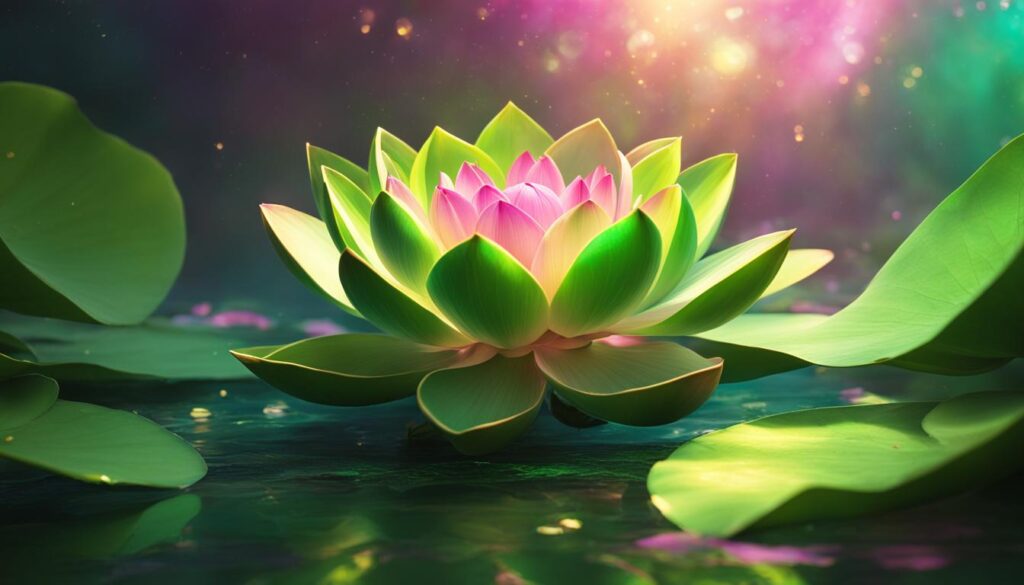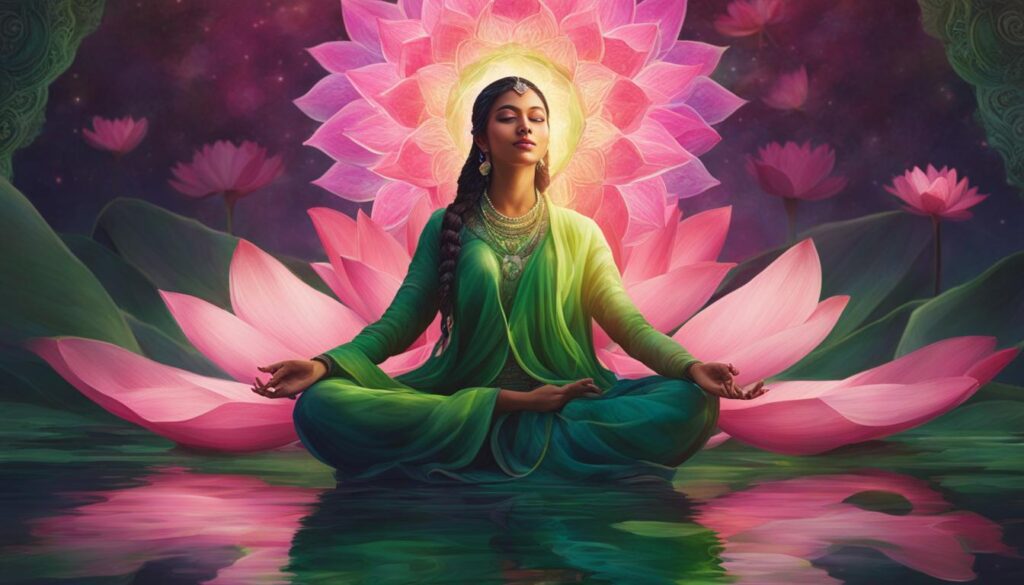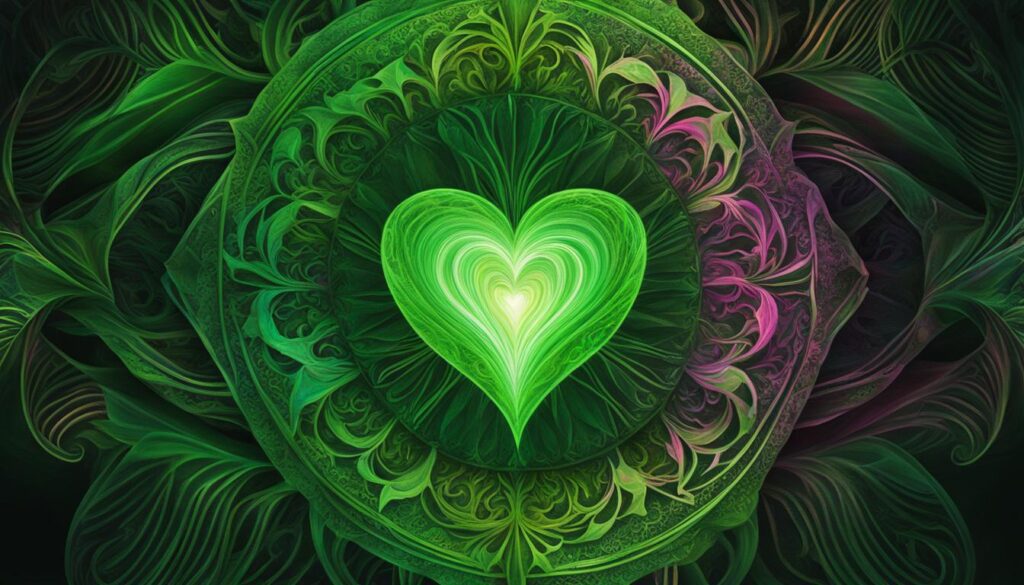
Unleash the transformative power of your heart chakra and embark on a journey of healing, emotional balance, and physical well-being. The heart chakra, also known as the Anahata chakra, is the energetic center that governs unconditional love, compassion, and connection. When this vital energy center is blocked or imbalanced, it can manifest as physical health issues and emotional distress.
In this comprehensive guide, we will explore the profound impact of the heart chakra on your overall well-being and provide you with techniques to heal and balance it. Using a combination of ancient wisdom and modern practices, you will learn how to tap into the power of unconditional love, embrace emotional balance, and cultivate compassion.
Key Takeaways:
- Understand the role of the heart chakra in healing and emotional balance.
- Recognize the signs of a blocked or imbalanced heart chakra.
- Discover practices to heal and balance the heart chakra, such as yoga, mantras, and essential oils.
- Learn how an open heart chakra can enhance relationships and self-acceptance.
- Incorporate daily practices to maintain a balanced and open heart chakra.
Understanding the Heart Chakra: Anahata Chakra
The heart chakra, also known as Anahata, is the fourth chakra in the system of seven primary chakras. It is located in the center of the chest, near the heart, and is associated with emotional balance, unconditional love, and compassion.
The heart chakra acts as a bridge between the lower and upper chakras, balancing the material and spiritual aspects of our lives. It is considered the seat of our emotions and serves as a guiding force for our relationships with ourselves and others.
When the heart chakra is balanced and open, we experience a sense of connection, empathy, and unconditional love. It allows us to feel compassion towards ourselves and others, promoting emotional well-being and harmonious relationships.
Heart Chakra or Anahata: The Fourth Chakra
| Chakra | Location | Color | Element |
|---|---|---|---|
| Anahata | Center of the chest | Green | Air |
“The heart chakra is the center of our emotional being, connecting us to the essence of love and compassion.” – Spiritual Teacher
Understanding the role of the heart chakra, Anahata, is essential for harnessing its healing power. By cultivating awareness and implementing practices that promote balance in this chakra, we can enhance our emotional well-being, embrace unconditional love, and foster meaningful connections with ourselves and others.
The Characteristics of the Heart Chakra
The heart chakra, also known as Anahata, is characterized by several qualities that play a crucial role in our emotional and spiritual well-being. Understanding these characteristics is key to harnessing the power of the heart chakra and cultivating a deeper sense of love, compassion, and connection in our lives.
Unconditional Love
One of the primary qualities associated with the heart chakra is unconditional love. This is a love that goes beyond conditions, judgments, or expectations. When the heart chakra is open and balanced, we can love ourselves and others without restriction, accepting them as they are and embracing their imperfections. Unconditional love allows us to experience profound connections and nurtures healthy relationships.
Compassion
Compassion is another defining characteristic of the heart chakra. It involves the ability to empathize with others, to understand their struggles and challenges, and to respond with kindness and care. When our heart chakra is open, compassion flows effortlessly, allowing us to extend a helping hand and provide support to those in need. Cultivating compassion not only benefits others but also promotes our own emotional well-being.
Forgiveness
Forgiveness is a powerful attribute of the heart chakra. It involves releasing resentment, anger, or grudges and embracing forgiveness as a way to free ourselves from negative emotions. When our heart chakra is balanced, we can forgive ourselves and others, allowing healing and emotional growth to take place. Forgiveness opens the door to inner peace and liberation from the burdens of the past.
Connection
The heart chakra enables us to form deep connections with others. It allows us to establish meaningful relationships based on trust, empathy, and vulnerability. When our heart chakra is open, we can create harmonious connections that nourish our souls and bring joy and fulfillment into our lives. Connection is essential for our emotional well-being and the cultivation of a sense of belonging.
Understanding and embracing the characteristics of the heart chakra can bring profound transformation and healing into our lives. By nurturing unconditional love, compassion, forgiveness, and connection, we can open ourselves up to the powerful energy of the heart chakra and experience greater emotional balance, joy, and fulfillment.

Signs of a Blocked Heart Chakra
A blocked or imbalanced heart chakra can have various signs and symptoms that indicate its state. Recognizing these signs is crucial for identifying and addressing imbalances in the heart chakra.
- Emotional Distress: One of the signs of a blocked heart chakra is experiencing emotional distress. This can manifest as feelings of sadness, anger, fear, or being emotionally closed off. Individuals with a blocked heart chakra may struggle to express or process their emotions in a healthy way.
- Difficulty with Forgiveness: Another sign of a blocked heart chakra is the inability to access forgiveness. People with an imbalanced heart chakra may hold grudges, struggle to let go of past hurts, and find it challenging to forgive themselves and others.
- Isolation and Withdrawal: Individuals with a blocked heart chakra often feel disconnected from others. They may isolate themselves, struggle to form deep connections, and have difficulty trusting in relationships. The fear of vulnerability can lead to a sense of emotional and social withdrawal.
- Physical Health Issues: Imbalances in the heart chakra can also manifest as physical health issues. Some common physical symptoms of a blocked heart chakra include high blood pressure, heart palpitations, chest tightness, and difficulty breathing.
By recognizing these signs, individuals can gain insight into the state of their heart chakra and take steps towards healing and balancing it.
“A blocked heart chakra can manifest as emotional distress, difficulty with forgiveness, isolation, and physical health issues.”
| Signs of a Blocked Heart Chakra | Description |
|---|---|
| Emotional Distress | Feelings of sadness, anger, fear, or emotional closure |
| Difficulty with Forgiveness | Struggles with letting go of past hurts and forgiving oneself and others |
| Isolation and Withdrawal | Feeling disconnected from others, difficulty forming deep connections and trusting in relationships |
| Physical Health Issues | High blood pressure, heart palpitations, chest tightness, difficulty breathing |
Healing and Balancing the Heart Chakra
The heart chakra is a powerful energy center that can greatly impact our emotional and physical well-being. When the heart chakra is imbalanced or blocked, it can manifest as emotional distress and even lead to physical health issues. However, by engaging in healing practices, we can restore balance and harmony to the heart chakra, allowing for the free flow of energy and promoting overall wellness.
Yoga Poses for Heart Chakra Healing
One effective way to heal and balance the heart chakra is through specific yoga poses that focus on opening the chest and promoting energy flow. Camel Pose, also known as Ustrasana, is a heart-opening pose that stretches the front of the body and stimulates the heart chakra. Fish Pose, or Matsyasana, is another pose that can help release blockages in the heart chakra and encourage energy flow. By incorporating these yoga poses into our practice, we can promote healing and balance in the heart chakra.
Mantras and Affirmations for Heart Chakra Healing
Another powerful tool for healing the heart chakra is the use of mantras and affirmations. By repeating positive affirmations such as “I am open to giving and receiving love” or “I forgive myself and others,” we can help shift the energy in the heart chakra and release any blockages. Mantras such as “Yam” (pronounced yahm) are also associated with the heart chakra and can be chanted during meditation or throughout the day to promote healing and balance in this energy center.
Additionally, incorporating breathwork exercises, guided meditations, and the use of essential oils can further support the healing process of the heart chakra. By engaging in these practices regularly, we can cultivate a sense of love, compassion, and emotional stability, allowing the heart chakra to function optimally and promoting overall well-being.

Heart Chakra Healing Practices
The heart chakra, also known as Anahata, can be balanced and healed through various practices that promote love, compassion, and emotional well-being. Incorporating these practices into your daily life can help release blockages and restore balance in the heart chakra.
Heart Chakra Yoga
Heart chakra-focused yoga classes can be immensely beneficial in promoting the flow of energy and opening the heart chakra. Poses that open the chest, such as Camel Pose and Fish Pose, are particularly effective in facilitating healing in this energy center. These poses stretch and expand the chest, creating space for emotional release and energy flow.
Essential Oils
Using essential oils can enhance the healing process of the heart chakra. Scents such as rose and lavender are known for their ability to evoke feelings of love, compassion, and harmony. You can apply these oils to your heart center, wrists, or temples, or incorporate them into your meditation or self-care routines.
Guided Meditation
Guided meditations that focus on opening and balancing the heart chakra can be powerful tools in your healing journey. These meditations often include visualizations, affirmations, and breathwork exercises that help release emotional blockages and cultivate love and compassion. Regular practice of heart-centered meditations can bring about profound shifts in your emotional well-being.
Breathwork
Conscious breathwork exercises, such as deep belly breathing and alternate nostril breathing, can promote healthy energy flow and balance in the heart chakra. By consciously directing your breath into the heart center, you can release stagnant energy and invite in fresh, revitalizing energy. Incorporating breathwork into your daily routine can support ongoing healing and maintenance of the heart chakra.
By engaging in heart chakra healing practices such as heart chakra yoga, essential oils, guided meditation, and breathwork, you can create a nurturing and supportive environment for the heart chakra to flourish. These practices promote the flow of energy, release emotional blockages, and cultivate love and compassion, allowing you to experience a profound sense of emotional well-being and connection.

Understanding Heart Chakra Imbalances
When the heart chakra is imbalanced, it can have significant effects on our emotional well-being, physical health, and relationships. An imbalanced heart chakra can lead to emotional distress, causing us to feel disconnected from ourselves and others. This can manifest as feelings of loneliness, isolation, and an inability to form deep, meaningful connections. Additionally, an imbalanced heart chakra can contribute to physical health issues, particularly those related to the cardiovascular system. It is crucial to recognize and address these imbalances in order to restore harmony and promote overall well-being.
Emotional distress is a common symptom of an imbalanced heart chakra. When the heart chakra is blocked, it can result in an inability to express or receive love, leading to feelings of sadness, anger, or resentment. This emotional turmoil can create a cycle of negative thoughts and behaviors, further perpetuating the imbalance. It is important to recognize these emotions and work towards healing and opening the heart chakra in order to restore emotional balance and find inner peace.
An imbalanced heart chakra can also have a significant impact on our physical health. The heart chakra is intimately connected to our cardiovascular system, and a blocked or imbalanced heart chakra can contribute to issues such as high blood pressure, heart palpitations, and even heart disease. By addressing and balancing the heart chakra, we can support the physical well-being of our bodies and reduce the risk of these health issues.
Table: Symptoms of an Imbalanced Heart Chakra
| Emotional Symptoms | Physical Symptoms | Relationship Issues |
|---|---|---|
| – Feelings of loneliness and isolation | – High blood pressure | – Difficulty forming deep connections |
| – Inability to express or receive love | – Heart palpitations | – Lack of empathy and understanding |
| – Anger, resentment, or sadness | – Shortness of breath | – Inability to forgive |
To address an imbalanced heart chakra, it is important to engage in practices that promote healing and balance. These practices can include heart-centered meditation, breathwork exercises, self-reflection, and practicing forgiveness and compassion towards oneself and others. By bringing awareness to the imbalances in our heart chakra and actively working towards restoring harmony, we can experience emotional well-being, improved physical health, and stronger, more fulfilling relationships.

Balancing the Heart Chakra in Daily Life
Balancing the heart chakra is an essential practice for promoting emotional well-being and cultivating love and compassion in daily life. By incorporating simple yet powerful daily practices, you can maintain a balanced and open heart chakra that radiates love and positivity. Here are some effective techniques to help you balance your heart chakra:
Acts of Love and Compassion
One of the most powerful ways to balance the heart chakra is through acts of love and compassion. Practice random acts of kindness, such as sending a thoughtful message to a loved one, volunteering, or simply offering a listening ear to someone in need. By extending love and compassion to others, you create a ripple effect of positive energy that nourishes your heart chakra.
Engaging in Self-care
Self-care is crucial for maintaining a balanced heart chakra. Take time each day to engage in activities that promote emotional well-being and self-love. This can include practicing meditation, journaling, taking soothing baths, or engaging in hobbies that bring you joy. Prioritizing self-care allows you to fill your own cup, ensuring that you have love and compassion to give to yourself and others.
Cultivating Gratitude and Forgiveness
Gratitude and forgiveness are powerful practices that open and heal the heart chakra. Take a few moments each day to reflect on the things you are grateful for, expressing appreciation for the abundance in your life. Additionally, practice forgiveness for yourself and others, releasing any lingering resentments or grudges. By cultivating gratitude and forgiveness, you create space for love and compassion to flow freely through your heart chakra.

Table: Heart Chakra Daily Practices
| Daily Practices | Description |
|---|---|
| Acts of Love and Compassion | Engage in random acts of kindness and extend love and compassion to others. |
| Engaging in Self-care | Dedicate time each day for self-care activities that promote emotional well-being. |
| Cultivating Gratitude and Forgiveness | Practice gratitude and forgiveness to open and heal the heart chakra. |
By incorporating these daily practices into your life, you can create a harmonious balance in your heart chakra. Remember to be patient and gentle with yourself, allowing the power of love and compassion to guide you towards a balanced and open heart chakra.
The Heart Chakra and the Subtle Body
The heart chakra is not just an isolated energy center; it is part of a larger system known as the subtle body. The subtle body consists of several energy centers, or chakras, that play a vital role in our emotional and physical well-being. These energy centers are interconnected, working together to maintain balance and harmony within us.
Located in the center of the chest, the heart chakra acts as a bridge between the lower and upper chakras, facilitating the flow of energy throughout the subtle body. It connects our physical and spiritual aspects, allowing us to experience love, compassion, and emotional well-being. When the heart chakra is open and balanced, it radiates unconditional love, enabling us to form deep connections with ourselves and others.
By understanding the connection between the heart chakra and the subtle body, we can gain insights into how our emotional and physical well-being are intertwined. When our heart chakra is blocked or imbalanced, it can manifest in various ways, such as emotional distress and physical health issues. Recognizing and addressing these imbalances is key to restoring harmony and promoting overall wellness.
| Heart Chakra | Subtle Body | Energy Centers | Emotional and Physical Well-being |
|---|---|---|---|
| Facilitates love and compassion | Consists of chakras | Interconnected centers | Balance and harmony |
| Acts as a bridge | Connects physical and spiritual | Flow of energy | Unconditional love |
| Emotional and physical impact | Interdependence | Recognizing imbalances | Promoting overall wellness |
The heart chakra and the subtle body work together to support our emotional and physical well-being. By cultivating a balanced heart chakra and nurturing the subtle body, we can experience greater harmony, love, and compassion in our lives.
The Power of an Open Heart Chakra
An open heart chakra is a powerful gateway to experiencing profound love, emotional balance, and fulfilling relationships. When the heart chakra is open and balanced, it allows us to embrace unconditional love, not only for others but also for ourselves. This deep sense of self-acceptance and love radiates outward, attracting harmonious relationships and fostering emotional well-being.
Unconditional love is the essence of an open heart chakra. It is the ability to love others without judgment, conditions, or expectations. When our heart chakra is open, we can approach relationships with compassion, understanding, and forgiveness. This enables us to form deep connections based on trust, empathy, and mutual respect. An open heart chakra also allows us to practice self-love and self-care, nurturing our own emotional well-being.
Emotional balance is another gift of an open heart chakra. It allows us to navigate life’s ups and downs with grace and resilience. When our heart chakra is open, we can process our emotions in a healthy way, allowing them to flow freely without becoming overwhelmed or suppressing them. This emotional balance empowers us to express our feelings authentically and connect with others on a deeper level.
Table: Benefits of an Open Heart Chakra
| Benefits | Explanation |
|---|---|
| Unconditional Love | An open heart chakra allows us to love without conditions, fostering deeper connections with others. |
| Emotional Balance | An open heart chakra helps us process emotions in a healthy way, leading to emotional stability. |
| Fulfilling Relationships | An open heart chakra attracts harmonious relationships based on trust, empathy, and mutual respect. |
| Self-Acceptance | An open heart chakra enables us to practice self-love and accept ourselves unconditionally. |
Cultivating an open heart chakra is a lifelong journey of self-discovery and growth. Through practices such as meditation, yoga, breathwork, and acts of love and compassion, we can nourish our heart chakra and keep it open. By embracing the power of an open heart, we can experience the profound joy and fulfillment that comes from living a life rooted in unconditional love, emotional balance, and authentic connections.

Conclusion
The heart chakra is a powerful center of healing and emotional balance, with profound effects on our overall well-being. By understanding its characteristics and recognizing signs of imbalance, we can embark on a journey of healing and transformation.
Through various practices such as yoga, meditation, and using essential oils, we can nurture and balance the heart chakra. These practices promote the flow of energy, enabling us to experience the power of unconditional love, compassion, and deep connections with others.
By cultivating an open heart chakra, we create space for emotional healing, self-acceptance, and healthy relationships. It is through this openness that we can find true inner peace, emotional stability, and physical well-being.
Embrace the power of the heart chakra and embark on a path of healing, emotional balance, and unconditional love. Nurture your heart chakra and experience the profound transformation that awaits.
FAQ
What is the heart chakra (Anahata)?
The heart chakra, also known as Anahata, is the fourth primary energetic center in the body, representing love, compassion, and openness. It is associated with the color green and is located in the center of the chest, known for unconditional love, compassion, and emotional balance.
What are the characteristics of the heart chakra?
The heart chakra is associated with qualities such as unconditional love, compassion, forgiveness, and the ability to form deep connections with others.
What are the signs that your fourth chakra may be blocked?
Signs of a blocked heart chakra can include feelings of isolation, an inability to access empathy or forgiveness, being overly critical of oneself or others, difficulty in trusting others, feeling unworthy of love, and experiencing difficulties in relationships.
How can I heal and balance my heart chakra?
Healing and balancing the heart chakra can be achieved through practices such as yoga poses that open the chest, mantras and affirmations focused on love and compassion, and breathwork exercises.
What are some heart chakra healing practices?
Heart chakra healing practices include engaging in heart chakra-focused yoga classes, using essential oils such as rose or lavender, practicing guided meditations, and incorporating breathwork exercises.
How can an imbalanced heart chakra affect me?
An imbalanced heart chakra can lead to emotional distress and physical health issues, as well as difficulties in forming deep connections and experiencing unconditional love.
How can I balance my heart chakra in daily life?
Balancing the heart chakra in daily life can be achieved through acts of love and compassion, engaging in self-care activities, and cultivating gratitude and forgiveness.
How can you open the heart chakra?
Practices such as yoga, meditation, breathing exercises, and using affirmations can help open and balance the heart chakra, allowing the energy to flow freely.
What are heart chakra affirmations?
Heart chakra affirmations are positive statements that focus on love, compassion, and self-acceptance, helping to heal and balance the energy of the heart chakra.
What is the function of the heart chakra?
The heart chakra is responsible for governing emotions, relationships, and our ability to give and receive love. It helps us to cultivate empathy, forgiveness, and compassion.
How can you bring balance to your heart chakra?
Engaging in activities that promote self-care, practicing forgiveness, surrounding yourself with the color green, and nurturing loving relationships can help bring balance to the heart chakra.
What are some yogic practices for unblocking the heart chakra?
Yoga poses such as backbends and chest-opening asanas, along with pranayama (breathing exercises) and meditation, can help release blocked energy and open the heart chakra.
What are the key benefits of an open heart chakra?
An open heart chakra allows for deeper connections with others, fosters self-love and compassion, enhances emotional healing, and brings a sense of inner peace and balance.
What are the associations of the heart chakra with the color green?
The color green is associated with growth, harmony, and balance, reflecting the qualities that the heart chakra embodies, such as love, compassion, and renewal.
How does the heart chakra help in creating a state of openness?
The heart chakra, when balanced and open, allows us to approach life with an open heart, free from fear and emotional barriers, fostering a state of receptivity and authenticity.
What is the connection between the heart chakra and the subtle body?
The heart chakra acts as a bridge between the lower and upper chakras, maintaining balance in the subtle body and facilitating the flow of energy.






